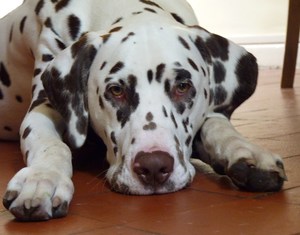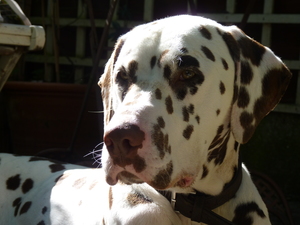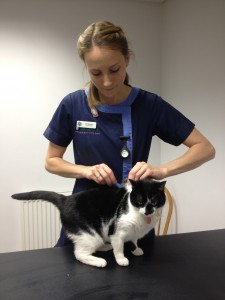Jude came to see us in May after he started vomiting. Initially we gave him symptomatic treatment to help his nausea and sensitive food to help his upset stomach. In many cases of vomiting our patients are feeling much better within a day or two. Unfortunately the next day Jude wasn’t feeling much brighter and didn’t really want to eat his food. For dogs that aren’t improving quickly we have to consider whether there is more going on. Sometimes they just need some support such as intravenous fluids, but we also have to consider other causes such as a blockage within the gastrointestinal tract, or even problems with other organs such as the liver or kidneys.

We therefore kept Jude in the hospital for further investigation. When he came in he was a bit sore when we felt his abdomen. Having eaten a few things he shouldn’t in the past, our concern was that Jude may have swallowed something that could have become stuck in his intestines. Although we were suspicious of this we took some blood from Jude to rule out some of the other causes of vomiting and started him onto some fluids into his vein to stop him becoming dehydrated.
To investigate further we took some x-rays of Jude’s abdomen. We can often see a foreign body on an x-ray film, especially metal objects or stones. However softer objects and fabric do not show up well. On Jude’s x-rays we could not see anything obvious to confirm that he had something stuck. However when we put an endoscope into his stomach we could see some material blocking the passage of food out of his stomach. Because of the blockage, food and water had only one way to go…back up again!
We took Jude to surgery to remove the blockage. We had to make several holes in Jude’s intestine to remove it all as it was a long piece of fabric that had worked its way down in what is called a linear foreign body. The fabric had also caused a hole in Jude’s intestine as it tried to move through, which meant some food material was leaking into his abdomen. Removing a foreign body can be a risky surgery as after the operation the wounds can sometimes break down because the gut is damaged by the blockage. This can cause infection in the abdomen called peritonitis, and can be fatal. As Jude had had a leakage from his gut there was a higher risk of infection post op.
Therefore, following surgery we do everything we can to try and prevent infection. The wounds in the gut have to be checked thoroughly and the abdomen is lavaged with many litres of sterile water to dilute and wash away any bacteria. Jude was also put onto antibiotics following his surgery.
Unfortunately despite this Jude had a post op complication as he got an infection. This meant that he had to go back to surgery to have his abdomen flushed for a second time. Thankfully following this Jude went from strength to strength and within a few days was bouncing out the door on his way home. Jude has since made a full recovery. We just hope that he will be sticking to his biscuits next time.






